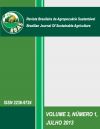CHEMICAL EVALUATION OF WASTE INDUSTRIALIZATION OF CASSAVA AND ITS EXPLOITATION IN THE DEVELOPMENT OF RATION FOR RUMINANT ANIMALS
DOI:
https://doi.org/10.21206/rbas.v3i1.195Abstract
Popularly known as cassava, the root of this plant (Euphorbia flour, the genus Manihot) serves as raw material for the production of table flours (fine flour, biju, farofa quenched among others) and starch, however, use of cassava as a carbohydrate source to produce alcohol (ethanol) is nothing new. The root of this plant is a source of starch and breakage of this molecule results in fermentable sugars which are then converted into alcohol by a biochemical process. The industrialization of cassava generate waste and when it comes to producing alcohol, vinasse is produced, seen as the main wastewater generated by sugarcane mills. The process of industrialization of cassava happens in factories known as flour mills, and those that industrialize the starch. From small to large, these industries have to deal with the waste that is generated in the process. The use of waste only brings advantages to industries such as: attendance of environmental standards, sustainability and income generation, and all this create a positive image of companies that pass in front of society to gain more credibility and reach new horizons in the market. In this work, the waste bark, between bark, scrapes, cassava stillage and vinasse were evaluated by chemical analyzes. The objective was to evaluate the nutritional potential of this waste in preparing a diet for ruminant animals. The results showed that the mixture of bark, between bark and scrapes with vinasse can be regarded as an energy source, but it has considerable protein value, due to enrichment with vinasse, and can be easily used in the diets of ruminant animals.Downloads
Downloads
Published
2013-07-01
How to Cite
Marcelo Silva Ferreira. (2013). CHEMICAL EVALUATION OF WASTE INDUSTRIALIZATION OF CASSAVA AND ITS EXPLOITATION IN THE DEVELOPMENT OF RATION FOR RUMINANT ANIMALS. Brazilian Journal of Sustainable Agriculture, 3(1). https://doi.org/10.21206/rbas.v3i1.195
Issue
Section
Artigos
License
1. Proposta de Política para Periódicos de Acesso Livre
Autores que publicam nesta revista concordam com os seguintes termos:
Autores mantém os direitos autorais e concedem à revista o direito de primeira publicação, com o trabalho simultaneamente licenciado sob a Licença Creative Commons Attribution que permite o compartilhamento do trabalho com reconhecimento da autoria e publicação inicial nesta revista.











